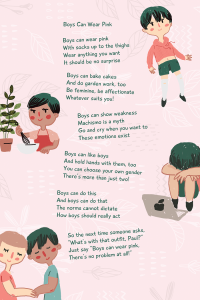
- In Dapitan, underneath Rizal’s tarnished skin is history being rewritten.
- The only thing I learned in school is that Dapitan City is just a place where Jose Rizal was exiled. Everything was centered around him: the city’s history, its progress, historical sites. But the weird thing is, when I was growing up there, no one ever mentioned his name at all.
- Well, that’s aside from the school named after him, where my grandfather used to teach law subjects. And the huge shrine by the shore, where his silhouette would loom as the sun goes down, reminding the city of his presence. But other than that, it’s as if he never even existed.
- It is a family tradition of ours to be “exiled” in Dapitan; each grandchild of Papa and Mama would spend an entire summer with them, away from the rest of the world. It is my turn now, and I was half-excited, half-dreading to stay there without my phone, my parents, and my cousins.
- It is a twelve-hour ride to the city, from Davao, by land. I slept throughout the entire trip, hogging the backseat all to myself while my uncle and aunt argued about where we would stop to eat merienda.
- I remember the different routes we have taken on the way to Dapitan, back when I was still in grade school. One time we stayed in Cagayan de Oro since it was getting dark, and my dad was too sleepy to keep driving. Another time we rode a ferry from Dumaguete, and that took roughly two hours, but I felt like vomiting the entire time. There was also a time where we rode a plane from Manila, but we landed in Dipolog because Dapitan doesn’t have an airport. Each visit to the place is different, but all seemingly familiar.
- Sunlight spills through the jalousies, and the roosters outside start to trumpet, as if to say welcome home. I slither to the side of my bed, eyes still crusty from last night’s twelve-hour drive, and my feet feel the dusty, creaking wooden floor, in search of my slippers.
The first thing I smell is the sweet scent of marang. The second, Mama’s warm, bitter cocoa sikwate. I drag my feet downstairs and see my 70-year-old grandmother, who looks just like my mom, but with short hair and a shorter fuse. “No good morning, Rapachung?” She says.
“Good morning, Mama,” I say sheepishly. I give her a peck on her wrinkled cheeks. “Where’s Papa?”
“He’s in Potol, playing tennis.” The usual morning routine. We share the same time zone, but my bedtime is my grandfather’s call time in Potol, where he plays tennis with the rest of the retired court judges. See you in court is a joke as old as they are.
- My mother and her siblings grew up here, in this two-storey house that they say is haunted, with a garden so huge they called it the “hundred acre woods,” and when we were little we would go Easter egg hunting there with all my cousins.
Now that it’s just the three of us in the house, the garden really does feel like a hundred acres.
- Potol is just a bike ride away. On sunny afternoons, the entire street is teeming with food vendors, henna tattoos, and DIY braces––Libre Taod, as the sign says. Free installation. Their only tennis court is filled with children bouncing back and forth.
Today is a good morning, indeed. Peace and quiet, save for the sound of tennis shoes kissing the concrete, and racquets lobbing the tiny neon ball.
I wave at Papa, and he waves his racquet and smiles. All gums and no teeth.
- In Dapitan, we have about a million relatives in our clan. This person is a relative of that person who is a distant cousin of the other person. Everyone in the clan calls each other geng, the same way Davaoeños call each other bai.
Well, everyone except for Papa, because we always call him “Justice.”
“Geng, asa ta mangaon?” or “Musta naman ka, ‘geng?” Everything starts or ends with geng. I’ve always wondered where the name came from, so one day I asked my aunt. She said it began with Palangga, which means ‘beloved’ in Binisaya, then it was shortened to langga, then shortened further to gang, until it finally ended up as geng. The term of endearment for literally everyone–an all-encompassing, all-purpose name that is commonly used in our family reunions and gatherings, where there are so many people it is impossible to remember each of their names. The next thing I knew, I was calling everyone Geng as well.
- I squeeze my way through the Plaza. People are leaving the halls of St. James the Greater, waving croton leaves, locally known as parpagayo, to the sound of drums and trumpets and church bells. They look like pompoms, only green and red, and veiny.
I still wonder if people really kissed the statue on the altar after the mass had ended, because the mere thought of it is gross.
Viva Señor Santiago! Someone shouts.
Viva! We yell back.
“Sleep early, Rapachung,” Mama says, unfolding her hand fan on one hand and patting her forehead with a hanky on the other. “You were sleeping again at Mass.”
In my defense, I had no idea we would go to Mass every single morning. Every single morning for an entire week, then the week after that, then the week after that. It is an absolute nightmare—no wonder they call this an exile.
- One thing I missed in this place: the public beach. No, not Dakak’s expensive, imported white sands, but the only one in the city that is open to the public. The first beach I went to that had black sand. No one really knows the name of the beach, but my relatives call the place “Boulevard.” Its origins were probably buried deep in the sand, but when people from the city say “Maligo ta sa Boulevard,” this is where they would go.
On my bike, I watch people melt under the heat of April, with cold beer and sunblock, their feet buried in the soft, black sand as I ride the stretch of the shoreline.
- Another thing I have missed in this place: Tita Marooch and her chicken lollipops. She is my mom’s distant cousin, but in Dapitan she is her bestest friend. Basically she cooks chicken wings shaped into lollipops, crispy with a little spicy kick. For me it was “the best in the whole entire world,” as I said when I was six. A decade later, my slogan still stands.
“Rapachung! You just biked going here? That’s quite far!” Tita Marooch is holding a glass tray of freshly cooked chicken. No time for talking, I gobble up the entire tray.
- When she was young, my mom had the nickname Peruka, which means “doll-eyed” in Subanen. Nanay gave her that name, and it stuck to her as she grew older. When she visits Dapitan, people call her Peruka the same way people call me Rapachung. The name feels warm, like the feeling of holding a steamy hot cup of Mama’s sikwate with both hands.
Nanay is Mama’s sibling. In Dapitan, they call her by her Subanen name, which means “Princess.” And when we visited their house in Piñan, I asked if I had a Subanen name, too.
She places a hand on my shoulder. “Miyaka,” she says. “Little one.”
- In a few hours my uncle and aunt would stop by our house and pick me up and send me back to Davao. I squeeze the memories into a duffel bag.
- I watch the wipers move back and forth, sweeping the tears pelting the windshield. I watch the city behind me getting smaller and smaller until it is nothing but a memory.
Raphael Luis J. Salise is taking up creative writing in UP Mindanao. He has been a fellow to the Davao Writers Workshop.
 The noon sun hangs high overhead, glaring into the canopy of my F4U Corsair as it hurtles along at 425 kilometers per hour. The noise of its R-2800 Double Wasp engine, a guttural howl, fills my ears as I cast my eyes around, trying to pick out the tiniest speck against the deep, dark blue of the sky.
The noon sun hangs high overhead, glaring into the canopy of my F4U Corsair as it hurtles along at 425 kilometers per hour. The noise of its R-2800 Double Wasp engine, a guttural howl, fills my ears as I cast my eyes around, trying to pick out the tiniest speck against the deep, dark blue of the sky.